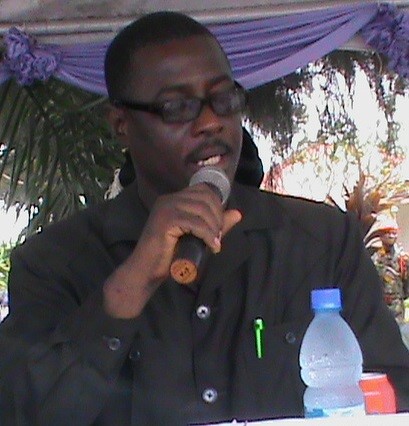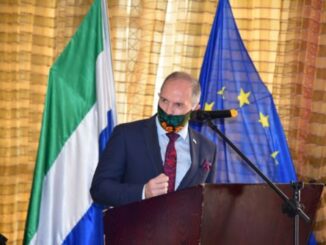
Freetown, Nov. 12, 015 (MOHS) – The Ministry of Health and Sanitation in collaboration with Options Consultancy Services Ltd. and Evidence for Action (Mamaye) will be organizing a one day Consultative Conference on the status of Emergency Obstetric and Newborn Care facilities in Sierra Leone.
Director Reproductive and Child Health, Dr. Santigie Sesay
The conference which is expected to take place at the National Stadium Atlantic hall in Freetown on November 12, 2015 will focus on the effect of the Ebola virus disease outbreak that claimed the lives of over 3,000 people and the Recovery Phase within the framework of maternal and newborn care.
The Ministry of Health and Sanitation noted that prior to the Ebola outbreak in 2014, the country had made substantial progress towards a number of maternal and child health indicators following the introduction of the Free Health Care initiative. Based on the results of the Demographic and Health Survey of 2013 there have been notable coverage gains in accessing health facilities including modern contraception of 7 percent to 16 percent, Skilled Birth attendance 42 percent to 62 percent, Malaria bed net utilization 26 to 49 percent, Malaria treatment 6 percent to 77 percent, Diarrhea management 68 percent to 88 percent and basic immunization 54 percent to 78 percent.
According to the Directorate of Reproductive and Child Health, there are seven identified enablers that needed to be fulfilled prior to achieving full emergency obstetric newborn care status. The enablers enumerated are Water and sanitation, Electricity, Referrals, Blood handling and laboratory services, Staffing, Equipment and drugs and essential supplies. Based on the Ministry of Health and Sanitation Facility Improvement Team (FIT) assessment there is no facility in the country that is certified to be classified as emergency obstetric and newborn care.
The consultative conference with regards the challenges, aimed at galvanizing efforts of local councils, Ministry of Health, relevant ministries and health related partners to support the process of emergency obstetric and newborn care compliance. The conference at the end of the day is expected to have a firm idea of priorities and plans which the Ministry of Health and Sanitation can further develop and share after the conference.
Specific objectives include identifying the numerous reasons for high maternal and child deaths in Sierra Leone, Prioritize the reasons for maternal and child death, Discuss and suggest solutions, Disseminate the July 2015 FIT assessment and identify specific challenges in the process of producing emergency obstetric and newborn care compliant facilities. To lobby line Ministries of Finance, Water Resources, Energy, and health related NGOs to support the emergency obstetric and newborn care initiative among others.
JAK/KK/MOHS/SLENA




